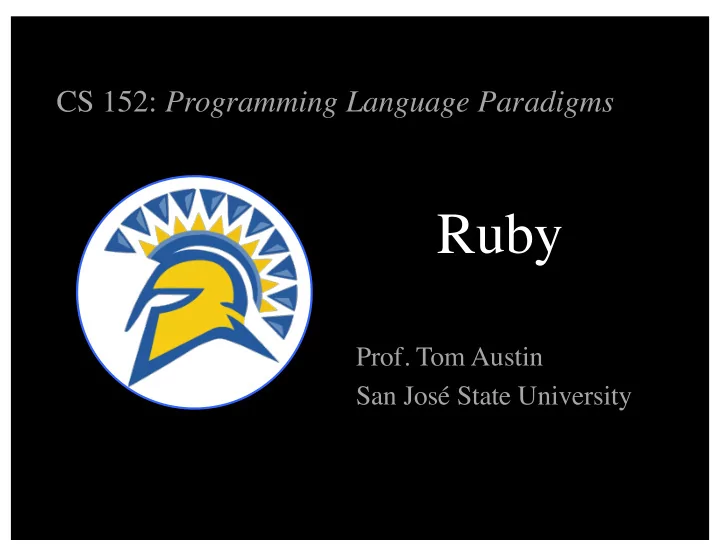

CS 152: Programming Language Paradigms Ruby Prof. Tom Austin San José State University
Introduction to Ruby Created by Yukihiro Matsumoto (known as "Matz")
Ruby influences Smalltalk • everything is an object • blocks • metaprogramming Perl • regular expressions • function names
Ruby on Rails • Ruby's "killer app" – lightweight web framework – "convention over configuration" • David Heinemeier Hansson (DHH) – initial framework was PHP – abandoned PHP for Ruby
Hello World in Ruby puts 'Hello world!'
Working with data structures a = [1,2,3] m = {'a'=>"Apple", 'b'=>"Banana", 'c'=>"Cantalope"} puts a[0] puts m['a']
Ruby is object-oriented "I was talking with my colleague about the possibility of an object-oriented scripting language. […] I knew Python then. But I didn't like it, because I didn't think it was a true object-oriented language — OO features appeared to be add-on to the language. As a language maniac and OO fan for 15 years, I really wanted a genuine object-oriented, easy-to-use scripting language. I looked for but couldn't find one. So I decided to make it." --Matz 1999
class Person def initialize name # Constructor @name = name The @ indicates an end object's field def name # Getter return @name The = in the method end name (by convention) indicates assignment def name= newName # Setter @name = newName end def say_hi # Method puts "Hello, my name is #{@name}." end end
Generating getters and setters Powerful class Person metaprogramming attr_accessor :name def initialize name # Constructor @name = name end def say_hi # Method puts "Hello, my name is #{@name}." end end
Using a class in Ruby p = Person.new "Joe" puts "Name is #{p.name}" p.say_hi
Inheritance in Ruby (in-class)
Mixins • Allow user to add features to a class • Similar to interfaces in Java, but programmer can specify functionality. class Person include Comparable end
module RevString def to_rev_s to_s.reverse end end class Person # Re-opening class include RevString def to_s @name end end p.to_rev_s # p defined previously
Blocks in Ruby
Blocks in Ruby • Superficially similar to blocks in other languages. • Can create custom control structures. • (We'll discuss in depth another day).
File I/O Example (in class)
Dynamic code evaluation
eval • Executes dynamically • Typically, eval takes a string: eval "puts 2+3" • Popular feature – especially in JavaScript • Richards et al. The Eval that Men Do , 2011 • Source of security problems
Additional Ruby eval methods • instance_eval – evaluates code within object body • class_eval – evaluates code within class body • Take a string or a block of code – block of code more secure
String Processing
Regular Expressions in Ruby s = "Hi, I'm Larry; this is my" + " brother Darryl, and this" + " is my other brother Darryl." s.sub(/Larry/,'Laurent') puts s s.sub!(/Larry/,'Laurent') puts s puts s.sub(/brother/, 'frère') puts s.gsub(/brother/, 'frère')
Regular Expression Symbols • /./ - Any character except a newline • /\w/ - A word character ( [a-zA-Z0-9_] ) • /\W/ - A non-word character ( [^a-zA-Z0-9_] ) • /\d/ - A digit character ( [0-9] ) • /\D/ - A non-digit character ( [^0-9] ) • /\s/ - A whitespace character: /[ \t\r\n\f]/ • /\S/ - A non-whitespace char: /[^ \t\r\n\f] / • * - Zero or more times • + - One or more times • ? - Zero or one times (optional)
References for Ruby • "Programming Ruby: The Pragmatic Programmer's Guide", http://ruby- doc.com/docs/ProgrammingRuby/ • "Why's Guide to Ruby", http://mislav.uniqpath.com/poignant -guide/ (unusual, but entertaining reference). • David Black, "Ruby for Rails", 2006.
Lab: Eliza in Ruby Use Ruby to model a psychiatrist. http://en.wikipedia.org/wiki/ELIZA Download eliza.rb from the course website and extend it. Note that if you call `ruby eliza.rb -test`, you will get some cases to consider.
Recommend
More recommend